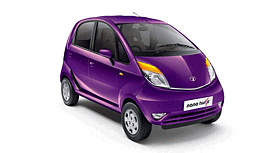Introduction

The Nano is a study in contradictions. It was originally conceived to be the poor man’s car, but the poor man doesn’t have a car in our country. Not yet. It met all the things it promised – it was good-looking, cheap, seated four six-footers in comfort, and, accounting for all the things that went against it like a fluctuating Rupee and having to move a completely built factory across the breadth of the country, it miraculously managed to stay within sight of its intended target price. Even so, it hasn’t racked up the numbers that Tata Motors expected. Here, then, is the 2013 Tata Nano with the electronic power steering that promises to make up for the shortcomings of the previous model.
Exterior

The 2013 Nano looks similar to the current one: the same cartoonish cute looks, the same stance, everything. The changes on the outside are subtle, but they work effectively to make it look better. In the front, there is a slightly reworked bonnet, with a prominent central crease.

The bottom edge of the bonnet now has a chrome strip that runs across it, giving it a premium feel. Walk around to the side, and you’ll notice that the wheel caps are new. They are a fresh new design, and the design is so good, they’re almost as good as alloys, though we have to admit that the wheels on the Anniversary Edition, which were true alloys, are more fetching.

At the rear, there is a tiny rear wing and a chrome strip just above the bumper. Among the new colours that you can get your Nano in, is this lovely Damson Purple (introduced with the Twist), while the Dazzle Blue and Royal Gold updates from MY13 also increase the appeal by more than a few notches.
Interior

The interior is where you will notice a lot of the changes that make the 2013 Nano a much better car than the outgoing model.

First, there are twin gloveboxes on the dashboard, on either side of the center console, and these are available on the CX and LX variants. Next, is the audio system. It looks plain, but it has an Aux-in port, a USB port and can also support Bluetooth streaming. Not only this, there are now four speakers in the car, two mounted next to the gloveboxes on the dashboard, and their surrounds match the exterior paint on the car.

The seats have redesigned padding, and they are more comfortable than before. Tata has also paid particular attention to driver ergonomics, which shows in the larger diameter steering wheel and the repositioned gear lever that has been moved a little behind with a some intelligent engineering. The power window switches are now behind the gear lever, which is better than before, and the hazard lights switch is placed at the top of the centre console.

At the rear, things remain much the same, but the improved fabric and plastic quality is much more evident. You can also specify ‘all black’ interiors if you so wish. This might be a placebo effect of the better interiors, but the new Nano also feels like a quieter place to be in than before, with less NVH compared to the outgoing model.

Apart from the power steering, the Twist variant also gets a new instrument cluster and it, like its music player, has everything that is expected from a modern day, mid-sized car. The digital fuel gauge shows distance to empty with average fuel efficiency. Every time you switch on the car it runs a self-check with the speedo needle returning to naught after going to the other end.
Engine and Gearbox

The engine hasn’t changed – it remains the 624cc parallel-twin petrol that makes 37bhp and 51Nm, and puts it to the road via a four-speed manual transmission through the rear wheels. The gearing has changed – it has become slightly taller, with each gear offering around 10kph more speed. Tata has paid attention to the little things here as well: not once did I stall the new Nano, something which happened to me regularly with the old one.

The clutch pedal’s feel and engagement is lot better now. The shift quality has become more positive, meaning quicker shifts are possible. Most new drivers of the Nano are uncomfortable about leaving the car in third in highway speeds, but with the engine’s better refinement, it is often that you will hit the limiter accidentally. With a full load, the Nano tends to struggle up inclines, but this is often cured by a simple downshift. Fourth gear is an overdrive gear, so third needs to be used a lot more if you’re going to make spirited progress.

The diesel engine is scheduled to release soon, but we’d love to see an automatic in this car – it would round off its appeal as a city car. Shame that the price won’t allow so sensible a move on Tata’s part.
Power Steering

Tata introduced a larger steering wheel with the MY13 car, what this has done is reduce the efforts a bit, especially when the car is at a standstill. Of course that is still nowhere compared to the easy of having power steering. Tata did get this feedback from its customers and hence the new Twist variant with electronic power assisted steering (EPAS).

The power steering designed by ZF is extremely light and has something called the ‘Active Return’ feature that basically pulls the steering back to straight-ahead position when released. Basically it works like any conventional system and is no retrofit that has just made the steering lighter.
EPAS is a well-made system, there is absolutely no play in the steering wheel, although the one and half turn to full lock from straight-ahead (three turns from lock to lock) is an overkill considering the fact that the turning radius is just four meters. It is probably so to limit excessive input as the wheel is too light. But understand that the light steering wheel is not a complaint; on the city streets, which is its ideal hunting ground, it has sharpened the Nano’s prowess. The Twist can out-do an auto rickshaw at its own game and that is probably the best compliment I can give to any car regarding city driveability.
At high speeds EPAS does weigh-up slightly, but you have to be easy on the steering considering this is a rear-wheel-drive and it will take only so much to overcook a turn. I wasn’t expecting any feedback from a basic EPS, so nothing to complain about on that front. On the whole Tata has done a brilliant job with the EPAS and I think whatever extra they charge for this variant is worthwhile.
Verdict

The top-spec 2013 Nano retails at approximately Rs 2.25 lakh. That’s an eye-watering increase over Ratan Tata’s original target price, but when you compare the Nano to whatever else is available in the market, it still offers the best value by far for your money. We’re left cribbing about things like “there should have been an optional airbag” or “the doors still swing all the way open or shut on you when parked on an incline” but in the larger scheme of things, they are not big enough issues to turn you away from purchasing the car.
Talking specifically about the Twist, I think Tata has now solved the last glitch in making the Nano a complete package for city use. The Nano Twist is worth a look because of a surprising factor: it is an inexplicably desirable car. And for that, Tata deserves a giant pat on the back.























